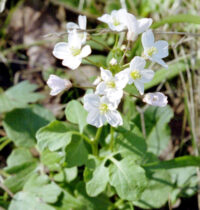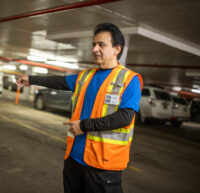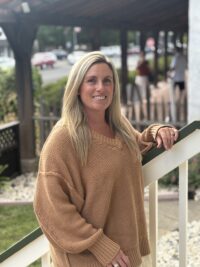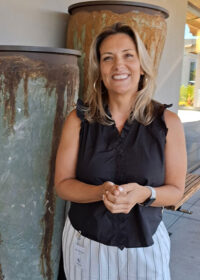Aspiring journalist, nonprofit worker, and local radio host, the people-curious Kilgore will attend the Columbia School of Journalism this fall. The Sun’s Anna Pier checks in.
How did you get into interviewing people?
For my senior thesis in anthropology at George Washington University on “Ride sharing: the human aspect of autonomous vehicles.” My question was, ‘What will happen to human interaction when cars are driverless?” I interviewed 35 or 40 Lyft and Uber drivers in the DC area.
The drivers were captive subjects.
Not really. When I asked if I could interview them, I said I’d give them five stars anyway. Such a variety of people, and so many stories. A retired sociology professor. An Afghan immigrant who had been a translator for the army. Many with other jobs. It has a personal feel because you’re in the person’s car, in their life. After I graduated in 2018, I worked in a Tesla demo store in downtown DC. I was interested in how the company talked about autonomous vehicles. But I got to hear so many stories as I sat in the passenger seat for a half-hour ride. I realized that everyone has a story that’s interesting, if you ask the right questions.
Next step?
I moved to Amman, Jordan, where I worked for a nonprofit I’d taught ESL through during college. AIESEC. It’s an international network creating work exchanges for people under 30 from 110 countries. It’s a Tom’s model, meaning for every job placement, AIESEC gave a portion to the refugee camps. Specifically, I was helping find internship opportunities in Amman for young people from all over the world.On the team there was an Italian, an Afghani, a Tunisian, and the rest Jordanians.
Did they all speak English?
Yes and no. But I had studied Arabic for four years in college. But what they teach in college is Formal Standard Arabic, which is a little like speaking Middle English. So in Amman I took classes in spoken Arabic, which helped a lot.
And then?
I returned from Amman for health reasons, and went to work on a dude ranch in Wyoming, and then in 2019 I went on internships from the same AIESEC to Brazil. My mother is Brazilian, and she raised me speaking Portuguese. One of the internships was teaching ESL in a tiny village in the northeast. I had taught ESL for six months during college. Meanwhile, I was thinking of going to grad school to study “social science of the internet,” but 2020 brought the pandemic and it upended all my plans. I was here in Sonoma. So I volunteered at Sonoma Overnight Support. I was cooking, washing dishes, anything needed. I started volunteering on a Monday, and on Friday they hired me. Kathy King, the executive director, really believed in me, which I appreciate.
How long were you at SOS?
Three years. Kathy had seen my LinkedIn, and she said, “I think we need to get you doing more.” I worked to set-up the drive-through fundraisers. I helped create a database so all the services could be digitally tracked. How many meals? How many showers? Laundry? Bus passes? Plus the in-kind donations, e.g., hair cuts. By the way, the meals went from 17k to 60k+ during that time. Also I did a photo/interview study called “Humans of the Haven,” which is posted on SOS’ Instagram.
After SOS?
The City of Sonoma, City of Petaluma, and Sonoma County contracted me to help with what had been proposed by the consultant Andrew Henning, to incorporate the national best case practices locally. One example is to create a “by name” list of everyone receiving services. And coordinating services from various providers, including Sonoma Community clinic, SOS, Homeless Action Sonoma, FISH, the Fire Department. The providers meet weekly by Zoom. They create and review a vulnerability index for each person. The goal is “Built for Zero,” for homelessness to be “rare, one-time, and brief.”
What have you liked about your work?
I really just like the people. Helping to connect someone with housing, a meal, a service. Helping create a system that works for them. Hearing their story.
For the past two years you’ve had an interview show on KSVY.
Yes, “Hello Sonoma,” Tuesdays from 4-5 pm. I got connected to KSVY from doing PSAs for Sonoma Overnight Support. All the people at the station helped me discover my passion for audio journalism. I interview locals who are making a difference in the Valley.
So you’re off to study journalism at Columbia next month. Isn’t it a doomed field?
There’s a lot of room for adaptation. The media landscape has lots of opportunities for connecting people, sharing their full story. I think platforms are going to continue to evolve.
What will you miss about Sonoma when you go to study in Manhattan?
A while ago I got some “I ‘heart’ Sonoma Valley” stickers from the Visitors Bureau. I take them everywhere. It’s a great way to introduce people to our community, but an even better reminder of how special this place where I grew up is. Besides the beauty of the Valley itself, I’ll miss the people. Of course my family and my dog, but everyone I’ve made friends with.
After Columbia?
I like national radio. We’ll see. Steve Jobs famously said, “You can only connect the dots going backward.” By the way, this interview has helped me do that. But as for the future, I haven’t connected the dots.










Be First to Comment